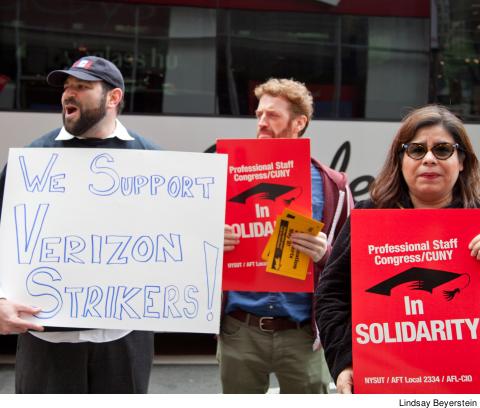Using globalization to squeeze out unions
 |
On April 13, some 40,000 Verizon workers walked off the job, eight months after the expiration of contracts between the company and two unions, the Communications Workers of America (CWA) and the International Brotherhood of Electrical Workers (IBEW). As Clarion went to press more than a month into the strike US Secretary of Labor Thomas Perez called all parties back to the negotiating table for a round of discussions that began on May 17.
But beyond a settlement of salary and benefits demands, at issue is the broader question of how corporations are leveraging globalization and the reshaping of the US economy to squeeze unions out of the workplace.
Verizon is split into two parts: The wireless/cell phone business is treated by the company as an entity that is separate from the rest of the company’s services and products, which include legacy landline phones and the Fios fiber-optic network, which is used for providing internet, television and telephone landline service. By keeping the newer cellular business apart from the company’s other components, Verizon executives have been able to keep unions from organizing the fastest-growing and most profitable piece of the business. Union leaders say that workers on the wireless side have been intimidated by the company, and a card-check agreement reached in 2011 proved fruitless because by the time that contract was settled there was no time left to organize a campaign before the agreement expired.
For Keisha Sanders, a unionized temporary employee of Verizon, that’s the number one concern that brought her to a rally in support of Verizon strikers that took place in Lower Manhattan on May 5. “They’re squeezing out the wireless [side] from unionizing,” she said. After that, she named the company’s insistence that it be permitted to move workers anywhere within the Verizon footprint for as long as two months at a time – a demand the company has since partly walked back. “If you tell me tomorrow that I have to travel to Virginia, where do I find childcare?” she asked.
In the meantime, the unionized part of the Verizon workforce is experiencing a loss in job security as the company moves call centers to states with anti-labor laws (so-called “right-to-work” states), and drags its feet at expanding its Fios fiber-optic network – sometimes in contradiction of promises it made to local governments. In New York City, Verizon had agreed to make Fios available to every household by the end of June 2014. But as of March, one-third of New York households still had no access to the network, according to Crain’s New York Business. The workers who would be laying that fiber-optic cable are union members.
GOOD JOBS
“It’s affecting us, but it’s affecting the communities that need access to high-speed internet,” said Rich Corrigan, a Verizon installation and repair technician on strike with CWA Local 1101. “It’s impacting society in general, really,” Corrigan told Clarion during the union rally in Lower Manhattan, especially, he said, in low-income areas. “Internet is now the new lifeblood of the country” – a utility, he added, much as the hardwired phone line was in the past.
The day before the unions were set to go on strike, the company announced a $300 million deal to bring Fios to Boston.
“The strike is fundamentally about whether there are going to be any jobs – good jobs – in America,” Bob Master, political director for CWA District 1, told Clarion. And it’s not as if Verizon shareholders would suffer terribly were the wireless side to unionize. “Verizon has made $1.5 billion a month in profits every month for 15 straight months,” Master said.
In addition to its astronomical level of profit, Verizon enjoys another huge cash advantage: It pays no federal corporate income tax. In fact, according to a report by Americans for Tax Fairness, Verizon actually made money with its last tax filing; researchers found that when Verizon’s actual tax rate was calculated it was in the negative: -2.8 percent.
“It’s long been known that the same companies that are hostile when they deal with their employees are also going to be avaricious with their taxes [and] toward their treatment of consumers,” said Lawrence Mishel, co-chair of Americans For Tax Fairness and president of the Economic Policy Institute, in a phone interview with Clarion conducted from his Washington, D.C. office.
UNION SOLIDARITY
PSC members have been joining the picket lines set up by IBEW and CWA outside Verizon Wireless stores, and the Graduate Center chapter has “adopted” the picket line outside the store at 34th Street and Broadway, picketing Monday and Wednesday evening each week “until the Verizon workers win,” according to an email sent to chapter members on May 13. (See the “15-minute activist” on page 8 for details on how you may show solidarity with Verizon strikers.)
Verizon workers have returned the favor. At a PSC rally organized by the College of Staten Island chapter to demand state funding for a fair settlement of the union’s long-expired contract, Verizon strikers from CWA Local 1102 turned out. Patrick Youngkin, a Verizon lineman, told the Staten Island Advance: “Unions are few and far between. If we don’t all stand together, we’re done.”

